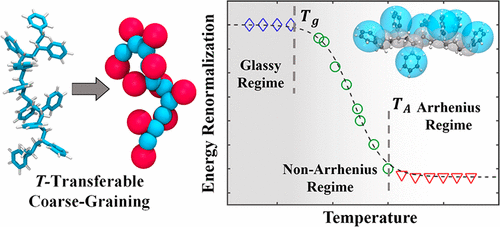当前位置:
X-MOL 学术
›
Macromolecules
›
论文详情
Our official English website, www.x-mol.net, welcomes your
feedback! (Note: you will need to create a separate account there.)
Energy-Renormalization for Achieving Temperature Transferable Coarse-Graining of Polymer Dynamics
Macromolecules ( IF 5.1 ) Pub Date : 2017-11-01 00:00:00 , DOI: 10.1021/acs.macromol.7b01717 Wenjie Xia 1, 2, 3 , Jake Song 4 , Cheol Jeong 1 , David D Hsu 5 , Frederick R Phelan 1 , Jack F Douglas 1 , Sinan Keten 2, 5
Macromolecules ( IF 5.1 ) Pub Date : 2017-11-01 00:00:00 , DOI: 10.1021/acs.macromol.7b01717 Wenjie Xia 1, 2, 3 , Jake Song 4 , Cheol Jeong 1 , David D Hsu 5 , Frederick R Phelan 1 , Jack F Douglas 1 , Sinan Keten 2, 5
Affiliation

|
The bottom-up prediction of the properties of polymeric materials based on molecular dynamics simulation is a major challenge in soft matter physics. Coarse-grained (CG) models are often employed to access greater spatiotemporal scales required for many applications, but these models normally experience significantly altered thermodynamics and highly accelerated dynamics due to the reduced number of degrees of freedom upon coarse-graining. While CG models can be calibrated to meet certain properties at particular state points, there is unfortunately no temperature transferable and chemically specific coarse-graining method that allows for modeling of polymer dynamics over a wide temperature range. Here, we pragmatically address this problem by “correcting” for deviations in activation free energies that occur upon coarse-graining the dynamics of a model polymeric material (polystyrene). In particular, we propose a new strategy based on concepts drawn from the Adam–Gibbs (AG) theory of glass formation. Namely we renormalize the cohesive interaction strength and effective interaction length-scale parameters to modify the activation free energy. We show that this energy-renormalization method for CG modeling allows accurate prediction of atomistic dynamics over the Arrhenius regime, the non-Arrhenius regime of glass formation, and even the non-equilibrium glassy regime, thus allowing for the predictive modeling of dynamic properties of polymer over the entire range of glass formation. Our work provides a practical scheme for establishing temperature transferable coarse-grained models for predicting and designing the properties of polymeric materials.
中文翻译:

用于实现聚合物动力学温度可传递粗粒化的能量重整化
基于分子动力学模拟的高分子材料性能自下而上的预测是软物质物理学的主要挑战。粗粒度(CG)模型通常用于获得许多应用所需的更大的时空尺度,但由于粗粒度时自由度的减少,这些模型通常会经历显着改变的热力学和高度加速的动力学。虽然可以校准 CG 模型以满足特定状态点的某些特性,但不幸的是,没有可温度转移和化学特定的粗粒度方法可以在较宽的温度范围内对聚合物动力学进行建模。在这里,我们通过“校正”模型聚合物材料(聚苯乙烯)的动力学粗粒化时发生的活化自由能偏差来务实地解决这个问题。特别是,我们提出了一种基于亚当-吉布斯(AG)玻璃形成理论概念的新策略。即我们重新规范化内聚相互作用强度和有效相互作用长度尺度参数来修改活化自由能。我们证明,这种用于 CG 建模的能量重整化方法可以准确预测阿伦尼乌斯体系、玻璃形成的非阿伦尼乌斯体系、甚至非平衡玻璃态的原子动力学,从而可以对玻璃态的动态特性进行预测建模。聚合物在玻璃形成的整个范围内。我们的工作为建立温度可传递的粗粒度模型以预测和设计聚合物材料的性能提供了实用的方案。
更新日期:2017-11-01
中文翻译:

用于实现聚合物动力学温度可传递粗粒化的能量重整化
基于分子动力学模拟的高分子材料性能自下而上的预测是软物质物理学的主要挑战。粗粒度(CG)模型通常用于获得许多应用所需的更大的时空尺度,但由于粗粒度时自由度的减少,这些模型通常会经历显着改变的热力学和高度加速的动力学。虽然可以校准 CG 模型以满足特定状态点的某些特性,但不幸的是,没有可温度转移和化学特定的粗粒度方法可以在较宽的温度范围内对聚合物动力学进行建模。在这里,我们通过“校正”模型聚合物材料(聚苯乙烯)的动力学粗粒化时发生的活化自由能偏差来务实地解决这个问题。特别是,我们提出了一种基于亚当-吉布斯(AG)玻璃形成理论概念的新策略。即我们重新规范化内聚相互作用强度和有效相互作用长度尺度参数来修改活化自由能。我们证明,这种用于 CG 建模的能量重整化方法可以准确预测阿伦尼乌斯体系、玻璃形成的非阿伦尼乌斯体系、甚至非平衡玻璃态的原子动力学,从而可以对玻璃态的动态特性进行预测建模。聚合物在玻璃形成的整个范围内。我们的工作为建立温度可传递的粗粒度模型以预测和设计聚合物材料的性能提供了实用的方案。











































 京公网安备 11010802027423号
京公网安备 11010802027423号